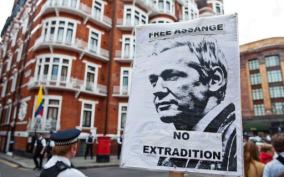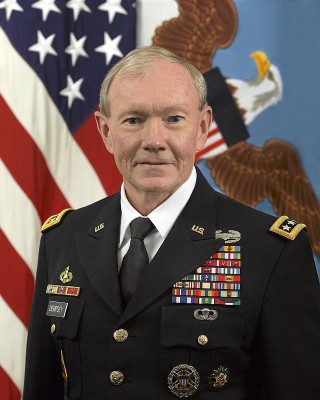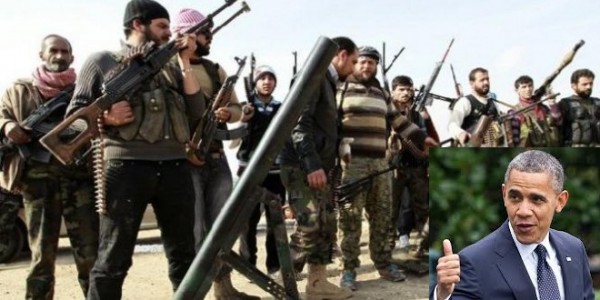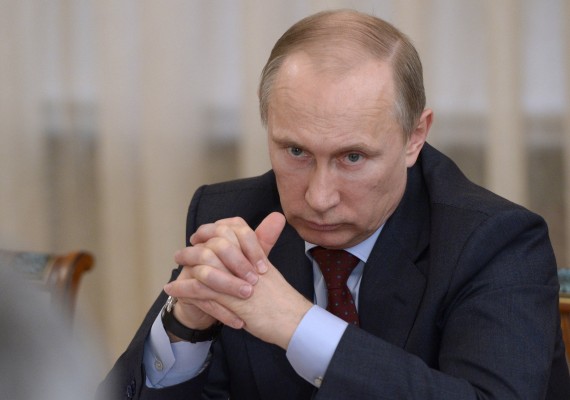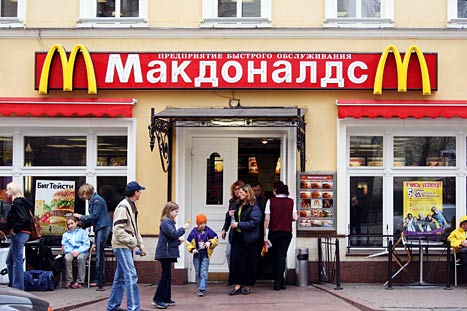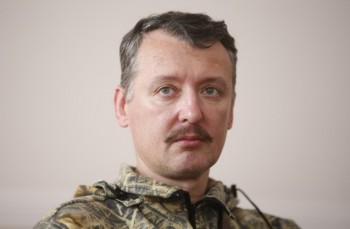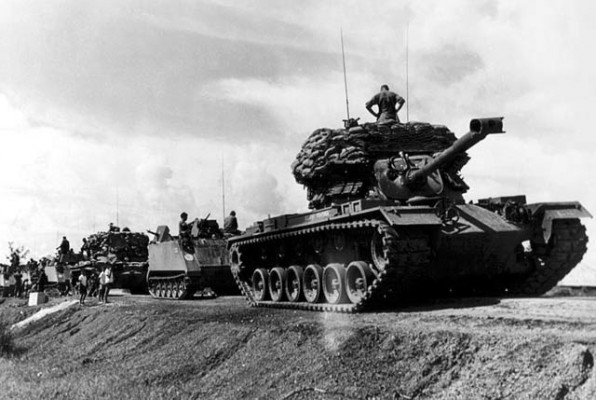
A US tank convoy during the Vietnam War. (Photo: Starry, Donn A. / Dept. of the Army)
[Y]ears after writing the much-read and controversial piece “Don’t Thank Me for My Service,” Camillo (Mac) Bica reflects on the same theme, responding to readers who were taken aback by his approach and veterans who found comfort in his words.
Also see: Don’t Thank Me for My Service
[A] number of years ago, I wrote an article published at Truthout in which I asked not to be thanked for my “service” as a United States Marine Corps Officer during the war in Vietnam. Clearly the article hit a nerve for both veterans and civilians. According to Truthout statistics, it has been shared over 2,700 times, and received 51,000 “likes.” While “dislikes” are not registered, judging by the feedback I received, I imagine that number to be significant as well.
I was motivated to write “Don’t Thank Me for My Service” for a number of reasons: First, I hoped to offer a sincere personal reflection of the Vietnam War experience to complement the mythology, lies and misinformation that has become so pervasive over the years, the latest being a 13-year Congressionally mandated “Commemoration” – probably “celebration” is more accurate – of the war’s 50th anniversary. I made no pretense in the article to be speaking for anyone other than myself.
Second, I attempted to express the profound and lasting impact the war had upon me, and so many others, who suffer from PTSD and moral injury – guilt, remorse, and shame for our involvement.
Third, I hoped to draw attention to the plight of veterans whose needs continue to be ignored – 23 veterans commit suicide each day – by a society that believes mouthing meaningless assertions of thanks and appreciation satisfies their obligation to the nation and to those who fight their country’s wars. Finally, and perhaps most importantly, the article expressed my acceptance of personal responsibility and culpability, as part of an errant American military machine, for the deaths of over 2 million Vietnamese people, many of them civilians, and the destruction of the Vietnamese countryside by Agent Orange, pink, purple, and green dioxin poisoning that continues to have disastrous environmental and human effects – horrendous birth defects suffered by Vietnamese children born long after the war had ended.
I was not drafted into the military; I chose to enlist, despite having the option of accepting a deferment from conscription offered to teachers at the time.
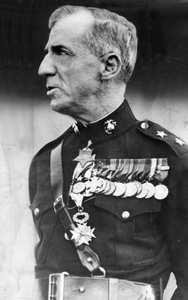
Smedley D. Butler: Soldier with a conscience.
In revisiting this article, it is not my intent to rehash the argument for the criminality of the Vietnam War. One has only to read Daniel Ellsberg’s “Pentagon Papers,” or watch Robert McNamara in The Fog of War, or listen to Lyndon Baines Johnson’s secret White House tapes, to name but a few sources, to realize that the Vietnam War was unnecessary, based upon lies and deception, motivated by greed and political ambition, and fueled by a communist hysteria and paranoia instigated and perpetuated by charlatans and opportunists.
Over the years, many have commented on this article. Some, perhaps a majority of combat veterans, found my perspective cathartic and expressive of how they also felt, but were unable, or chose not, to articulate.
Others disagreed, some offering coherent and interesting counterpoints. A few attacked me personally, angrily questioning my patriotism, even my having been in the military at all, condemning me as mentally unstable, weak, misguided, and as defaming the sacrifices of the injured and killed. Though ad hominem attacks add little to the dialogue, civil and rational discussion is always appreciated and valuable, so I thank everyone who took the time to voice their opinion, supportive or critical.
For the remainder of this article, I will abridge and respond to the insights and observations alluded to in the comments regarding my perspective on military “service.” In doing so, I hope to further clarify why I remain adamant that participating in the aggression and barbarism of the Vietnam War constitutes neither service to country – exactly what service did I provide? – nor something for which I should be proud or thanked.
Response to Readers’ Comments
Comment: Your article reads as though you were forced against your will into a military you profoundly disliked, to serve a Country you deeply hated. As a Marine Corps officer you were not drafted; it was your decision to enlist.
Response: It is true, I was not drafted into the military; I chose to enlist, despite having the option of accepting a deferment from conscription offered to teachers at the time. The fact that I went willingly into the military, that I have continued to work diligently for a peaceful, moral nation and for the well-being of veterans and members of the military is evidence enough, I think, that I did not then, nor do I today, hate America or the military. Nor does my volunteering preclude my commenting upon or making moral judgments about the war or obviate the validity of my observations regarding the reality and nature of the experience. Isn’t that one of the freedoms we take seriously in this country and are willing to fight, kill, and die in order to preserve?
Comment: You lament the killing and destruction that is inevitable in war. What did you expect war to be like? What did you believe you would be doing as a Marine during wartime?
In fact, soldiers are legally and morally required to obey only JUST orders and to disobey orders that are UNJUST and will be held personally accountable for a failure to differentiate one from the other.
Response: Though as a late adolescent, I was quite naïve and idealistic when I enlisted in the Marine Corps Officer Program, I was aware that the mission of the military, specifically the Marines, was fundamentally to kill people and blow shit up. Like most adolescents/young adults during the 1950s and ’60s, I learned about war from reading books and watching movies, particularly The Sands of Iwo Jima, starring the World War II draft dodger-turned-war/Marine icon John Wayne.
With the realization that war and the reason we are fighting was very different from what we had been told and from how it was portrayed in film, the mythology quickly crumbled, ideology forgotten, and war became a struggle for survival. Today children are much better “prepared” – perhaps conditioned is the more accurate term – for war, killing and destruction, having grown up playing sophisticated, “realistic,” and violent video games, some even created by the military, during an era of perpetual war.
Comment: You express regret about participating in the Vietnam War, in doing what you were told “needed to be done.” Did you not understand that it is the duty of members of the military to follow orders?
Response: Though some may mistakenly believe that the old adage, “Theirs [is] not to reason why, theirs [is] but to do and die,” characterizes military service, it is not the intent of the military to create automata that blindly and unquestioningly obey ALL orders they may receive. In fact, soldiers (1) are legally and morally required to obey only JUST orders and to disobey orders that are UNJUST and will be held personally accountable for a failure to differentiate one from the other. So the fact that an individual serves in the military does not entail a forfeiture of autonomy, her ability to reason. Soldiers do not abandon their moral agency at the recruiting station or induction center. They remain obligated to make legal and moral choices regarding the orders they receive. Fighting in an illegal and unnecessary war is criminal and the order to do so unjust.
Comment: Soldiers are warriors not diplomats, politicians, lawyers, or moralists. It is not the soldiers’ responsibility to make legal and moral judgments or determinations of necessity regarding the war. Shakespeare made this clear. “We know enough if we know we are the king’s men. Our obedience to the king wipes the crime of it out of us.”(2) The honor, merit, and nobility of the soldiers and the value of their service and sacrifice depends not upon the legality, morality, or necessity of the war but is contingent upon their willingness to selflessly serve their country, to follow orders, to do their job proficiently – to kill and destroy – without question or complaint. Consequently, regardless of the legal and moral value of the war in which they participate, soldiers are deserving of gratitude and should be justifiably proud of their service.
Comment: To question the necessity, morality and legality of the Vietnam War and to imply that soldiers who fought it are unworthy of gratitude and thanks is to violate a sacred trust and to demean the sacrifices of all who “served,” especially of those injured or killed.
The truth is that the wars in Vietnam, Iraq, Afghanistan and elsewhere, have absolutely nothing to do with preserving American freedom and values or with eliminating an existential threat.
Response: Contra Shakespeare, the Nuremburg Accords make clear that obedience to the orders of superiors does not obviate personal responsibility for the crimes of war. (3) Despite conscription – conscripts can refuse induction or claim conscientious objection – and especially in the all-volunteer Army, soldiers DO get to choose the war they fight and how they fight it. As argued above, under international, domestic and US Military Law, soldiers remain personally responsible for their actions and decisions and as such are obligated to make critical legal and moral judgments, many times under very stressful and coercive conditions, regarding whether to participate in a particular action or war.
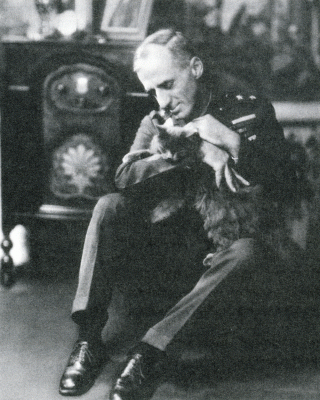
Being a good soldier does not imply becoming a robot. Gen. Butler enjoying a warm moment with a small friend.
Consequently, the value of the sacrifice is not inherent in the act of sacrifice itself, nor is it independent of questions about the merit of the policies that sent the soldier into harm’s way in the first place. Nor is the value of the sacrifice contingent only upon the soldier’s motivation, his dedication to the cause, to comrades, to his willingness to follow orders without question or to his proficiency to kill and to destroy. I am sure many of those we deem “terrorists” are highly motivated, proficient at what they do, willing to make great personal sacrifices for their cause, however misguided, and dedicated to their brethren. Yet, there is no nobility in their actions nor do we admire their dedication and selflessness. Consequently, the virtue, honor, merit, and value of a soldier’s service and sacrifice, depends in large measure upon the legality and morality of the endeavor in which he is engaged and the manner in which s/he conducts herself.
Comment: Members of the military make great personal sacrifices to ensure that freedom and American values prevail. Freedom is not free, you know. Fighting to preserve that freedom is an honor and a duty, deserving of thanks and appreciation, and something for which veterans should be proud.
“There are only two things we should fight for. One is the defense of our homes and the other is the Bill of Rights.”
Response: I agree that it is an obligation of citizenship to participate in the defense of America and of the freedoms we hold sacred – hence my enlisting into the Marine Corps when I, and so many others, were led to believe that our democracy, our cherished way of life, was in peril. For that, I have no regrets. What is tragic, and a violation of trust, is that we were then, and are now, being lied to. The truth is that the wars in Vietnam, Iraq, Afghanistan and elsewhere, have absolutely nothing to do with preserving American freedom and values or with eliminating an existential threat.
Comment: You entered into a contract with the government, took an oath to fight, kill, and, if necessary, to die for this great nation, not to criticize the decisions of our political and military leaders or whine about the justness or legality of the war.
Response: Soldiers’ obligations under the contract and oath are quite specific, as are the obligations of the other contractee, the government. Two-time Medal of Honor recipient and Marine Corps General Smedley Butler, (who can challenge these credentials?) correctly and succinctly explained why and when soldiers are obligated to risk their lives in battle. “There are only two things we should fight for. One is the defense of our homes and the other is the Bill of Rights.”(4)
The United States Government has, historically, been negligent in regard to fulfilling its obligations under the contract. First, it consistently fails to ensure that its military is “used” well, i.e., deployed only for legitimate national defense, and not as a tool of imperialism or as cannon fodder to increase the profit of oil companies, Wall Street executives, the arms industry, etc.
Again, General Butler: “I served in all commissioned ranks from a second Lieutenant to a Major General. And during that time, I spent most of my time being a high-class muscle man for Big Business, for Wall Street, and for the bankers. In short, I was a racketeer for capitalism.” (5)
Second, as even the mainstream media have documented of late, the government has failed in its contractual and moral obligation to adequately care for the needs of members of the military and veterans returning from war. It is not “complaining” or “whining,” therefore, to bring attention to this abuse of power – the violation of contract – by political and military leaders and the exploitation of veterans and members of the military. Rather, to speak the truth about war and its aftermath is, as General Butler made clear, a matter of personal honor and fidelity to fellow service members, veterans, and country.
Comment: You pontificate on the righteousness of your point of view and claim that anyone who disagrees is uninformed or misguided.
It is a reponsibility . . . to ensure that the sacrifices of comrades are not further exploited for corporate profit or to entice another generation of young men and women to fight wars that further enrich bankers and war profiteers.
Response: As moral agents, we are obligated to seek objective truth – it is not all perspectival – and to make correct moral and legal choices regarding our behavior. This is most critical and the obligation most stringent in regard to endeavors such as war that inevitably involve the taking of life. It is more than reasonable to expect, therefore, that morally sensitive and aware individuals who have experienced the insanity, horror and chaos of the battlefield and its aftermath and have become familiar with the facts of America’s involvement in Vietnam (and elsewhere), should understand, as did many combat veterans who commented on the article, that participating in the Vietnam War is not a source of pride, but of regret. I can understand, however, the motivation of those veterans who shun the truth and condemn truth tellers, choosing rather to embrace the mythology and hoping that the illusion of noble cause and personal heroism would somehow placate the demons that still haunt them today. As I argued in the original article, though, it may appear preferable to think oneself a hero than a dupe,
” . . . In order to truly come home from war, to make the perilous journey of healing, one must face the realities of one’s own war experience head on, as no healing is possible from fantasy, myth, rationalization and distortion of truth.” (6)
Comment: To question the necessity, morality, and legality of the Vietnam War and to imply that soldiers who fought it are unworthy of gratitude and thanks is to violate a sacred trust and to demean the sacrifices of all who “served,” especially of those injured or killed.
Response: Pointing out and bringing attention to the lies and deception and ensuring that the truth be told is not to demean the sacrifices of those who fought, suffered, and died. Nor is it unpatriotic, or a violation of the enlistment contract. Rather, it is a patriotic duty to set the record straight, to do what is in the best interest of members of the military and veterans, and to restore the moral character of this nation.
It is a responsibility, especially of veterans, to follow the heroic example of General Butler and to ensure that the sacrifices of comrades are not further exploited for corporate profit or to entice another generation of young men and women to fight wars that further enrich bankers and war profiteers.
And finally, I believed then, and I believe now, that a person, whether a soldier or civilian, should conduct herself with honor, according to personal principles, and the dictates of one’s conscience. To participate in an unjust war, a criminal act of aggression, a violation of International and Moral law, is dishonorable, an affront to one’s integrity, a violation of conscience, and foundational to the moral injury suffered by so many of our veterans.
To those who would argue that to speak out, to tell the truth about war is to betray some trust, some fidelity to Corps and comrade, I would ask, as our brothers and sisters continue to be maimed and killed in Afghanistan, and elsewhere; as trillions of dollars are diverted from education, infrastructure, and necessary social programs to fund the war machine; as the futility and waste of perpetual war becomes apparent even to the staunchest of war’s supporters, wars that benefit no one other than the obscenely wealthy – the war profiteers – what trust and fidelity to comrades is kept by your silence? (7)
Comment: It is inaccurate to suggest that a public expression of appreciation and gratitude to veterans and members of the military for their sacrifice and service is insincere and hypocritical.
All citizens in whose names these wars are fought must share responsibility; there is blood on all of our hands.
Response: Many “civilians” claim to adamantly support the troops, to be concerned with their well-being, and truly appreciative of their sacrifice and service. Since Vietnam, the end of conscription and the establishment of the all-volunteer army, the relationship between society and its military can best be characterized as distant, symbolic and superficial. “You fight and I will cheer you on from a safe distance, and express my gratitude and celebrate your sacrifices twice annually, Veterans and Memorial Day, with barbecues and sales at the mall.”
Andrew Bacevich, historian, West Point Graduate, retired Army Colonel, and Vietnam Veteran bemoans society’s indifference to the plight of the military and of veterans. He writes, “From the pulpit and podium and at sporting events, expressions of warmth and affection shower down on the troops. Yet when those wielding power in Washington subject soldiers to serial abuse (perpetual war) Americans acquiesce. When the state heedlessly and callously exploits those same troops (multiple deployments with inadequate down time), the people avert their gaze. Maintaining a pretense of caring about soldiers (and veterans), state and society actually collaborate in betraying them.” (italics mine). (8)
Conclusion
In this article, I have addressed some of the criticisms and concerns of those who have taken issue with my request not to be thanked for my “service.” If I’ve accomplished nothing else, however, I hope to have made clear that for many of us such a request or perspective on war is motivated neither by a hatred of America nor a profound dislike of the military.
While participation in illegal and immoral war is criminal, culpability and guilt is not ours alone. We live in a democracy, government by and for the people. Consequently, all citizens in whose names these wars are fought must share responsibility; there is blood on all of our hands. Most culpable, of course, are those political and corporate leaders who make war unnecessarily and profit from the death and carnage.
Despite the great personal anguish of having to relate, in many cases to relive, profoundly troubling memories and experiences, I will continue to write about the Vietnam War and its aftermath. I write from a sense of patriotism, a love of country, the same motivation that led me to enlist in the Marine Corps some 40 years ago.
I write from a profound concern for my fellow veterans and members of the military. I write to advise them and all Americans to become informed and remain vigilant against the warists and war profiteers who continue to exploit the soldiers’ legacy and sacrifices to entice another generation of young men and women to become the cannon fodder for corporate profit. As the quagmire of Iraq and Afghanistan has made clear, it is important that we heed the wisdom of the philosopher George Santayana who observed that, “Those who cannot remember (or learn from) the past are condemned to repeat it.” (9) And finally, I write to warn the politicians and war makers that there are many who see through their lies and deceptions and will not be intimidated or coerced into compliance or silence.
I will end this article as I did the original, with a plea to fellow Americans, both veteran and civilian, to abandon the mythology and the pretense of support and appreciation and do what is truly in the interest of this nation, our troops, veterans, and all those victimized by war.
” . . . Rather than merely mouth meaningless expressions of gratitude for something you don’t truly understand or care much about, do something meaningful and real . . . Make some demands. Demand, for example, an immediate end to the corporate takeover of our “democracy” and to the undue influence of the Military-Industrial-Congressional complex . . . Demand an immediate end to wars for corporate profit, greed, power and hegemony. Demand that we adhere to the Constitution and to the dictates of International and moral law.
Demand accountability for those who make war easily and care more for wealth, profit and power than for national interest or for the welfare of fellow human beings. And finally, if you are truly concerned about members of the military, demand that they be brought home now, and that they be adequately treated and cared for when they return.”
Notes:
2. Henry V, 4:1, II. 132-35.
4. Brigadier General Smedley D. Butler, War is a Racket, Feral House, 1936, 2003.
5. Ibid.
Don’t Thank Me for my Service.”
7. The United States spent $2 trillion funding the war in Iraq, 90 percent of that money going to the richest 1 percent of Americans who had nothing to lose and everything to gain.
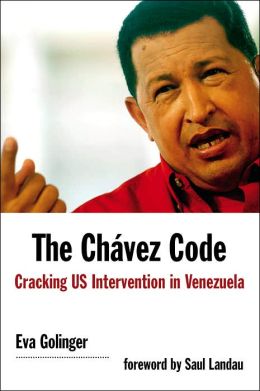 claiming they were “committed to finding a solution”, yet only according to their vision of the outcome: “We remain as committed as ever to reaching a diplomatic solution to this situation. We are clear that our laws must be followed and Mr Assange should be extradited to Sweden. As ever we look to Ecuador to help bring this difficult, and costly, residence to an end.” In other words, the British government sees no other solution than Assange’s extradition. Their unwavering, rigid position leaves no opportunity for diplomacy or creative problem-solving, which is what this case needs.
claiming they were “committed to finding a solution”, yet only according to their vision of the outcome: “We remain as committed as ever to reaching a diplomatic solution to this situation. We are clear that our laws must be followed and Mr Assange should be extradited to Sweden. As ever we look to Ecuador to help bring this difficult, and costly, residence to an end.” In other words, the British government sees no other solution than Assange’s extradition. Their unwavering, rigid position leaves no opportunity for diplomacy or creative problem-solving, which is what this case needs.